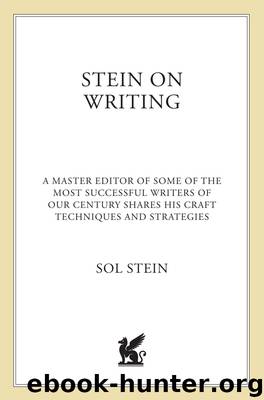Stein On Writing by Sol Stein

Author:Sol Stein
Language: eng
Format: epub, azw3
Publisher: St. Martin's Press
15
The Keys to Credibility
Credibility is central to much of what the writer does. He creates a world in which the invented characters must seem as real as the people who surround us in life. What happens to them, however extraordinary—and it should be extraordinary—must be believable. The motivations of the characters should be credible. And that provides the occasion for the writer to meet his biggest enemy, himself.
The writer has a natural tendency to act as we all do in life—that is, we question the motivations of others more often than we do our own. When creating fiction, those characters are our selves and we cover for them. This leads to a variety of problems.
I have watched as a bestselling action novelist once again has a character throwing another character over the railing of a ship. Think a moment, how many people do you know who would be capable of lifting a hundred and fifty pounds or more up from the ground high enough to toss that entire weight over a railing? In action fiction, the willing reader suspends disbelief. If one guy throws another over the railing, the reader goes with it. If a writer’s concerned about the quality of his writing and needs to say that “Tiny picked him up bodily and threw him over the railing,” he will have planted earlier that Tiny is six foot three and a weightlifter.
In fiction, plays, and film, planting means preparing the ground for something that comes later, usually to make the later action credible. Planting is necessary when a later action might seem unconvincing to the reader. Not all actions require planting. For instance, if Todd trips Andrew and Andrew then punches Todd, Todd’s action does need planting, Andrew’s punch does not.
In fiction that has a higher aim, the credibility of every important action in the story is at risk unless the writer is confident that the motivation or ability of the character makes the action credible.
Some inadequate motivation is easy enough to fix. For instance, if a character suddenly gets up to go shopping for the convenience of the author because something is going to happen in a shopping mall, the events in the mall may not be credible unless the motivation for the character going to the mall is planted ahead of time. The planting can be simple enough through a touch of humor:
“I’m not going to go on a shopping spree ever again. After today.”
Or you simply need to get a character out of the house. Instead of an unmotivated walk, he could say:
“These new shoes are not going to get broken in if I sit around the house.”
Some actions are so bizarre that it may seem next to impossible to motivate them:
We had been married for three years when, one Sunday, Tom dressed, as usual, in a shirt and tie, slipped into his handsome jacket, put on his best cordovan shoes, and left the house without his pants.
What conclusion can the reader come to, that Tom
Download
This site does not store any files on its server. We only index and link to content provided by other sites. Please contact the content providers to delete copyright contents if any and email us, we'll remove relevant links or contents immediately.
Asking the Right Questions: A Guide to Critical Thinking by M. Neil Browne & Stuart M. Keeley(5774)
Autoboyography by Christina Lauren(5234)
Eat That Frog! by Brian Tracy(4536)
Dialogue by Robert McKee(4400)
Sticky Fingers by Joe Hagan(4197)
Journeys Out of the Body by Robert Monroe(3624)
Annapurna by Maurice Herzog(3467)
Full Circle by Michael Palin(3448)
Schaum's Quick Guide to Writing Great Short Stories by Margaret Lucke(3379)
Elements of Style 2017 by Richard De A'Morelli(3349)
The Art of Dramatic Writing: Its Basis in the Creative Interpretation of Human Motives by Egri Lajos(3067)
Atlas Obscura by Joshua Foer(2961)
Why I Write by George Orwell(2951)
The Fight by Norman Mailer(2940)
The Diviners by Libba Bray(2937)
In Patagonia by Bruce Chatwin(2928)
The Mental Game of Writing: How to Overcome Obstacles, Stay Creative and Productive, and Free Your Mind for Success by James Scott Bell(2908)
Venice by Jan Morris(2573)
The Elements of Style by William Strunk and E. B. White(2473)
